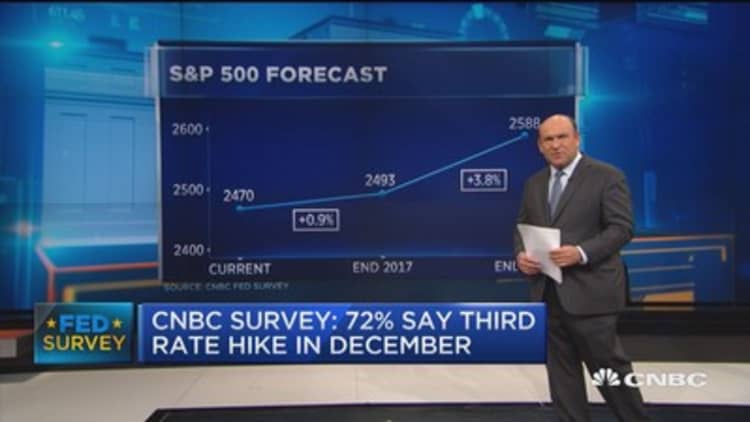
What a difference a year has made when it comes to how President Donald Trump views the stock market.
A year ago at this time when Trump was a candidate, he was calling the market "a big bubble." Now that stocks have rallied more than 11 percent since he stepped into the Oval Office, they're a sign that the business climate is "looking better than ever."
So which is it: A bloated beneficiary of overstimulated monetary policy, or an indicator that the business world is buying into the Trump pro-business rhetoric?
"As in most cases, there are three sides to every story, so probably neither of these is the correct assessment," said Carol J.S. Roth, head of Intercap Merchant Partners and a former investment banker who now advises entrepreneurs. "The market certainly today has more downside risk than upside risk. At the same time, I don't think there's any reason to be particularly bearish, either. The truth, as always, lies somewhere in the middle."
The market has scaled multiple new highs since Trump took office in January. In all, the Dow Jones industrials have gained about 11 percent over that period and this week crossed the 22,000 barrier for the first time. The Dow has gained just more than 20 percent since Election Day.
How much Trump has had to do with any of it is debatable.
The market trajectory clearly turned higher after the election on hopes that the president's agenda of lower taxes, less regulation and a spending boom for the nation's ailing infrastructure would be market-positive.
But there also have been several fundamental drivers of which Trump had little if any influence, particularly two strong quarters of corporate earnings that continued a trend begun before he assumed power.
"Anybody who has followed Trump during the entire course of his career, even predating politics, knows that he uses information to craft an emotional story," Roth said. "He is not a fact-and-numbers-based person. He is somebody who takes facts and numbers and pulls out the emotions behind them to get a desired effect."
Indeed, Trump has been banging the stock market drum loudly. A year ago, he railed against the Fed and Chair Janet Yellen for using low interest rates and monetary stimulus to boost the market. Now, he is saying Yellen has done a good job and he's a big believer in equity values as a reflection of economic performance.
The White House did not return a request for comment on Trump's changing views.
Everyone does it
By a CNBC count, he has tweeted about the rally no fewer than 11 times just since July 2, often chiding the media for not focusing on the string of record-setting closes. One of Trump's tweets during that time also boasted that unemployment is at its "lowest in 17 years," even though he routinely mocked the jobs numbers as fake during Barack Obama's presidency. (His claim about 17 years also is false; the unemployment level is at a 10-year low.)
Still, his supporters are likely to write it off as just Trump being Trump — or any other politician who has claimed achievements regardless of his influence over them.
"Every president takes credit for things or blames things that the previous president did. I don't think this is really specific to Trump," said Michael Yoshikami, founder and CEO of Destination Wealth Management. "If things were really horrible we'd be hearing that it was Obama's fault."
Things are not, in fact, horrible, though perhaps not as bountiful as Trump insists.
The stock market takes its cues from a number of places, with emotion often surpassing facts and data that paint an uneven picture for growth.
GDP has been growing a bit faster this year than it has during the recovery at an average 1.8 percent. Consumer confidence, as measured by the University of Michigan's benchmark survey, surged early in Trump's administration but is now at the lowest point this year. The unemployment rate has dropped considerably, falling from 4.8 percent in January to 4.4 percent in June. Job creation has averaged 180,000 a month, a bit slower than last year.
With everything taken together, Trump's "bubble" claims from last year don't hold up particularly well if he's going to keep praising stock market gains.
If anything, the market actually has gotten more expensive this year when comparing price with earnings. The is currently trading at about 21 times trailing earnings, or about half a percentage point higher than 2016, said Sameer Samana, global quantitative strategist at the Wells Fargo Investment Institute.
"At least from a valuation standpoint, you're not too different right now than you were at this point a year ago," Samana said.
But he, too, doesn't blame Trump for changing gears on his market view.
"The more you can persuade people that not only have things gotten better, you're the cause of them getting better, that's just good politics," he said.
— CNBC's Fred Imbert contributed to this report.


